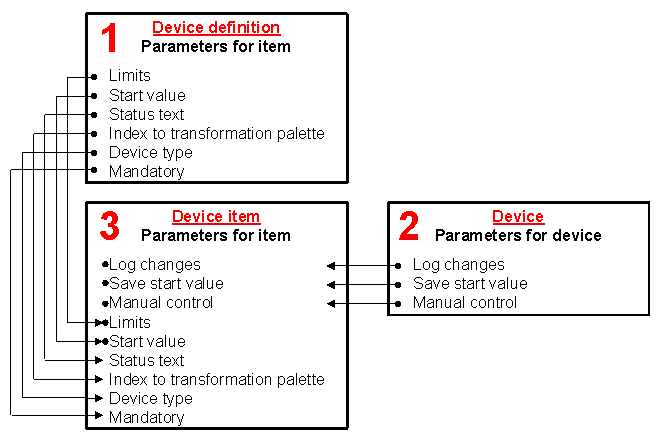The parent of an object of Device type is a respective Device definition. If a subdevice is connected to another device, this device becomes the parent (see Parental Relationships).
The character of object value depends on a Device definition.
For a Structured Device Definition, it is a one-row array. Row structure is given during creation by the parent object of the Device definition type (Device type parameter). Each value within a device has the following configuration parameters (similar to a structured variable):
- Log changes
- Save start value
- Manual control
- Start value
- Limits (VHL, HL, LL, VLL, Hysteresis)
- Status text
- Index to transformation palette
For an Array Device Definition, it is a one-column array, in which objects of Device type are connected. The type of connected device is given during creation by the parent object of the Device definition type (Device type parameter). Each value within a device has the following configuration parameters:
- Start value
- Name (row name)
Configuration parameters
To edit individual configuration parameters, click the left mouse button on the corresponding parameter. According to the type of the parameter, a value is entered by either typing into the input field or by selecting from the list.
Log changes
If the option is checked, each value change is to be written into the log database.
Save start value
If the option is checked, the start value will become a part of the configuration of the corresponding item and therefore each value change that occurred during the application run is written into the configuration database. An exception is for an item of an Object type. Then the start value is understood to be a reference to an object, not a value of an item. In this case, not the value changes are saved, but changes of the reference, that represents the item (see also the SET AS action for the object of EVENT type).
Example:
The object Sec is associated with the item DI.MyDevice[2]^Obj (that is of Object type), and the association is changed (e.g. in an event) to SysTime during the system run. If the option Save start value is not checked, this object change will not be saved in the configuration.
Manual
If checked, it allows controlling the item value during the system run. If the item is of an Object type, this option is applied to the reference to this object in the system (see also the SET AS action for the object of EVENT type). Setting a value for such an item causes redirecting the request to the object, the current reference points to (mainly it is not a change of the value).
Start value
Limits
Status text
The parameter can be changed only at the level of an object of Device definition.
Index to transformation palette
The parameter can be changed only at the level of an object of Device definition.
Device type
Configuration parameter specifying the device type for an item with Value type = Device can only be changed at the Device definition object level.
Name (row name)
Configuration parameter enabling naming of individual array items, if the device has an Array Device Definition. If the items are not named, their name is derived from the line number (1, 2, etc.). If the items are named, the name of the device connected to the array item changes to include the entered name - see an example: the DI.EMO.Blocks.BlockA and DI.EMO.Blocks.BlockB subdevices are connected to the array items of DI.EMO.Blocks device, the row names are BlockA and BlockB.
Definitions of configuration parameters
Each value of an item configuration parameter is defined in some way. The definition comes:
- from an object of Device definition (figure - section 1) (Status text, Index to transformation palette)
- from Device (figure - section 2) (Log changes, Save start value, Manual control)
- or it is defined directly on the item (figure - section 3) (Log changes, Save start value, Manual control, Start value, Limits)
Configuration parameters can be defined at various levels, as is shown in the following figure:
The figure shows the possibilities of the hierarchical definition of values of the configuration parameters, where arrows represent a possibility of inheritance of the parameter and the symbol represents a possibility (and also place) to define the parameter.
Related pages:


0 komentárov